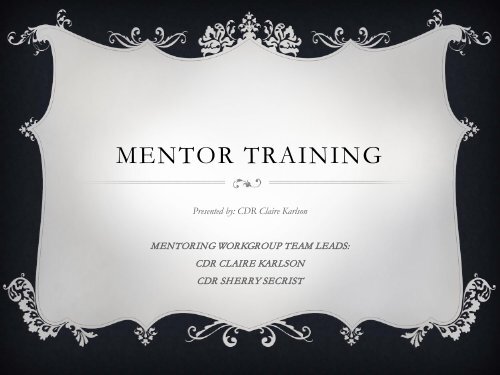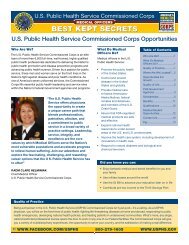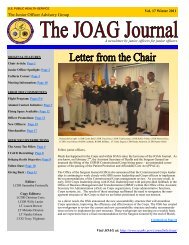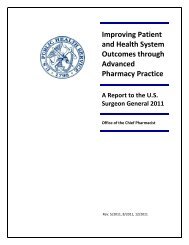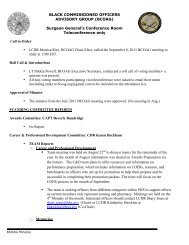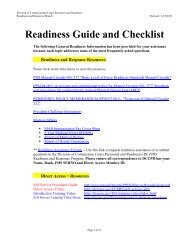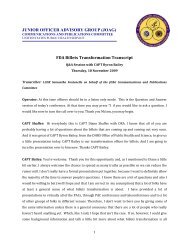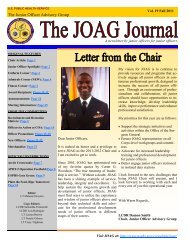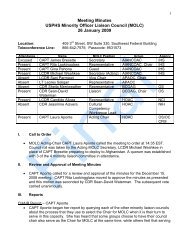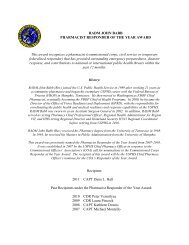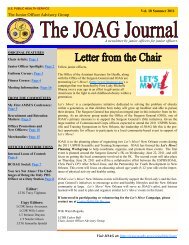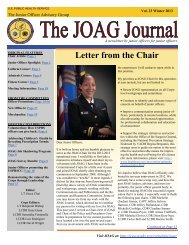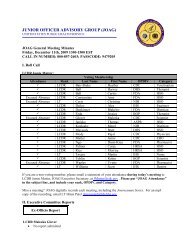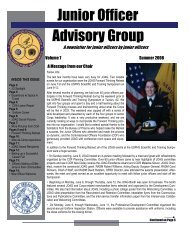Mentor training - U.S. Public Health Service Commissioned Corps
Mentor training - U.S. Public Health Service Commissioned Corps
Mentor training - U.S. Public Health Service Commissioned Corps
You also want an ePaper? Increase the reach of your titles
YUMPU automatically turns print PDFs into web optimized ePapers that Google loves.
MENTOR TRAINING<br />
Presented by: CDR Claire Karlson<br />
MENTORING WORKGROUP TEAM LEADS:<br />
CDR CLAIRE KARLSON<br />
CDR SHERRY SECRIST
CAREER DEVELOPMENT<br />
SUBCOMMITTEE OF THE<br />
NPAC<br />
Leads: CDR Marilyn Ridenour and CDR Mei-Ying Li<br />
Goals of Career Development Sub-Committee (CDS) include:<br />
• Participating in activities related to the identification of career needs of<br />
PHS nurses and facilitating programs to meet identified needs<br />
• Identifying resources within HHS personnel systems and developing<br />
additional resources, as necessary, to facilitate career development for<br />
nurses.
MENTOR WORKGROUP<br />
Consistent with these goals, the CDS has formed the <strong>Mentor</strong>ing workgroup with the<br />
following goals:<br />
• Facilitate the transition of junior nurse employees (civil service, tribal and CC officers)<br />
into the U.S. <strong>Public</strong> <strong>Health</strong> <strong>Service</strong><br />
• Identify nurse mentor(s) to provide information and serve as a resource to fellow PHS<br />
nurses throughout their career<br />
• Promote career development for the mentee thus providing a rewarding experience for<br />
both the mentor and mentee<br />
The program brings PHS nurses who have strong leadership abilities and critical<br />
knowledge into mentoring/coaching relationships with less experienced PHS nurses
The <strong>Mentor</strong>ing Workgroup<br />
(MWG)<br />
MISSION STATEMENT<br />
Serves to provide career development information to civilian, tribal, and<br />
CC PHS nurses in an effort to assist them in achieving their career goals<br />
• Who provides this information<br />
VISION STATEMENT<br />
To provide a centralized resource through which experienced nurses<br />
share career development information with less experienced nurses.
OBJECTIVES<br />
The N-PAC <strong>Mentor</strong>ing Program seeks to:<br />
• Provide PHS nurses the opportunity to share their knowledge, experience, insight and<br />
guidance to support the development of high-performing PHS nurses and future leaders.<br />
• Provide mentees with the opportunity to gain broader perspectives about PHS nursing,<br />
including its values, norms, expectations and culture.<br />
• Empower mentees to be more proactive in planning and achieving their professional<br />
goals; thereby enhancing their ability to make productive career decisions.<br />
• Encourage PHS nurses to participate in the development of others through the sharing<br />
of their expertise and knowledge.<br />
• Assist CC nurse officers to continue their professional growth upon Call to Active Duty<br />
(CAD) by educating nurse officers on policies and procedures, assisting nurse officers<br />
with their promotions and maintaining CC Basic Readiness, guiding nurse officers in<br />
proper and available avenues to maintain their nursing licenses, education, and skills, and<br />
providing a resource to nurse officers for all questions and concerns.
ROLES &<br />
RESPONSIBILITIES<br />
<strong>Mentor</strong>ing Working Group (MWG)-<br />
• Comprised of members from the CDS responsible for the creation,<br />
implementation, and monitoring of the N-PAC <strong>Mentor</strong>ing Program.<br />
Members of the MWG will be responsible for monitoring the AOL<br />
account, responding to routine inquiries, and assigning mentors, as<br />
appropriate<br />
<strong>Mentor</strong>ing Working Group Team Leads (MWG TLs)-<br />
• Leads of the MWG are responsible for the overall direction, successful<br />
implementation, and reporting on the <strong>Mentor</strong>ing Program.
ROLES &<br />
RESPONSIBILITIES<br />
<strong>Mentor</strong>ing Working Group IT Lead-<br />
• Member of the MWG responsible for tracking all progress and providing<br />
reports to the MWG TLs on program usage.<br />
Regional <strong>Mentor</strong> Coordinators / <strong>Mentor</strong>s-<br />
• Selected from a pool of volunteers with a premium placed upon broad<br />
knowledge of the culture and workings of the CC, Civil <strong>Service</strong>, or tribal<br />
personnel system generally, and the Nurse category specifically.
MENTORING WORKGROUP<br />
MEMBERS<br />
CDR Shawn Armes – BOP<br />
LCDR Sidney Hairston – HRSA<br />
CDR Jason Hartford – FDA<br />
CDR Deborah Schneider – DIHS<br />
CDR Duane Wagner – OS<br />
LT Christine Collins- OS<br />
CDR Jason Humbert – FDA<br />
CDR Melissa Robb - FDA<br />
Team Leads: CDR Claire Karlson and CDR Sherry Secrist
REGIONAL MENTOR<br />
COORDINATORS<br />
REGION 1: LCDR Janice Arceneaux<br />
REGION 6: CDR Deborah Schneider<br />
REGION 2: CDR Allen Blankenship<br />
REGION 7: CDR Jill Eich<br />
REGION 3: CAPT Lori Hanton<br />
REGION 8: CAPT Amy Anderson<br />
REGION 4: CDR Cathy Miller<br />
REGION 9: CDR Janet Mehring<br />
REGION 5: CDR James Pappas<br />
REGION 10: CDR Richard Leland/CDR<br />
Deanna Casiano
WHO IS THE MENTOR<br />
YOU
MENTOR<br />
Be a good listener<br />
Have empathy not sympathy<br />
Needs political savy<br />
Good at generating alternatives<br />
Comfort at the feeling level<br />
Talk the talk and walk the walk<br />
Most important – provide consistent and correct information on programs and<br />
policy
MENTORING VS<br />
COACHING<br />
WHAT IS THE TIME FRAME TO BE CONSIDERED<br />
COACHING?<br />
• An example of Coaching<br />
WHAT IS THE TIME FRAME TO BE CONIDERED<br />
MENTORING<br />
• An example of <strong>Mentor</strong>ing
MENTOR<br />
Provide essential ongoing support<br />
Training/coaching<br />
Troubleshoot issues<br />
Identify opportunities<br />
Ambassador<br />
• Passion<br />
• Excellent communication<br />
• Organizational skills
IDENTIFY YOUR OWN<br />
MENTORS:<br />
Someone who took an interest in your life<br />
• A role model<br />
• Someone who took an interest in your welfare when you were starting a<br />
new job, a new sport<br />
• Someone who helped to unleash a new talent, or ability in your life<br />
• A person who challenged you to have a new vision or take a new<br />
direction in your life.<br />
• That person who made you who you are today!
MENTORING<br />
Two distinct components<br />
• Active <strong>Mentor</strong>ing<br />
• Establish a proactive mentoring process<br />
• Junior PHS nurses are matched with more experienced PHS<br />
nurses to provide career development and counseling<br />
• e-<strong>Mentor</strong>ing (COACHING)<br />
• Provides a mentee with guidance for an immediate need<br />
• Intended to be short-term<br />
• This type of mentoring is sought out by the mentee and is<br />
accessible via the CDS webpage
WHO IS THE MENTEE?<br />
Any Nurse within the <strong>Public</strong> <strong>Health</strong> <strong>Service</strong><br />
• <strong>Commissioned</strong> <strong>Corps</strong><br />
• Civil <strong>Service</strong><br />
• Tribal
How are Mentee’s Assigned<br />
New Officer at OBC Open House<br />
E-mentoring<br />
• usphsnsgmentor@aol.com<br />
Requests for a mentor through other Officers or agencies to the<br />
Team Leads or RMC’s.
WHAT IS SUCCESSFUL<br />
MENTORING<br />
Difference between mentoring and coaching.<br />
• Coaching is short term, <strong>Mentor</strong>ing can be the life of your career.<br />
• Which are you?<br />
Balance of structure and flexibility<br />
Level of formality<br />
• Set goals and objectives<br />
• Timeframes<br />
Participant Training<br />
Progressive Tracking<br />
Communication<br />
Chain of command
MENTORING<br />
Progressive growth<br />
Flexibility in structure<br />
The needs of the mentee<br />
• Set milestones<br />
• Best time to contact<br />
• Opportunity to change mentorship<br />
• Be consistent
MENTOR<br />
Important skills<br />
• Don’t make decisions for the mentee<br />
• Don’t develop a dependency<br />
Be a role model<br />
Be a Leader<br />
• <strong>Service</strong><br />
• Integrity<br />
• Excellence<br />
• What does this represent?
POLICY & PROCEDURES<br />
Important<br />
• Read & ask questions<br />
• Check links<br />
• If links are outdated, contact your RMC<br />
• Know your mentees in your region<br />
Contact information<br />
Curriculum Vitae<br />
COERS<br />
Their goals and objectives & expectations
CHECK LIST GUIDE<br />
Important to go over the check list (Appendix F, pg. 19 in P & P)<br />
Date each accomplishment<br />
• Can you skip an area?<br />
What if you don’t know how to answer a question?
DCCPR<br />
What does the acronym stand for?<br />
Should I show this site to my mentee?<br />
If I don’t find the information I need, what should I do next?<br />
How do I find the following?<br />
• Category specific information can be found where?<br />
• Personnel assigned to DCCPR?<br />
• Statistical information:<br />
• How many Officers are there in the CORPS?<br />
• Nurse Officers in the <strong>Corps</strong>?<br />
• Which agency has the most nurses?<br />
• What grade is the largest in the NPAC category?<br />
http://dcp.psc.gov/CCMIS/StatusCharts/<strong>Public</strong>Pivot.aspx
As of June 14, 2012<br />
<strong>Commissioned</strong> <strong>Corps</strong> Officers:<br />
• 6691<br />
NURSE <strong>Corps</strong> Officers:<br />
• 1590<br />
STATISTICS<br />
NURSE <strong>Corps</strong> Officers by Agency: (top 3)<br />
• Indian <strong>Health</strong> <strong>Service</strong> – 521<br />
• Bureau of Prisons – 343<br />
• Division of Immigration <strong>Health</strong> <strong>Service</strong>s <strong>Corps</strong> -194<br />
NURSE by Temp. Grade<br />
02 - 138 03- 231 04- 479 05- 465 06- 272<br />
07 – 4 08- 1
N-PAC CHAIN OF<br />
COMMAND<br />
N-PAC<br />
Career Development<br />
Sub-committee<br />
<strong>Mentor</strong>ing<br />
Workgroup<br />
<strong>Mentor</strong>ing<br />
Workgroup Co-–<br />
Lead and Delegated<br />
Authorities<br />
Regional<br />
Coordinators<br />
I T Lead<br />
Open House<br />
Region 1 Region 2<br />
Policy Procedure<br />
Review<br />
Region 3 Region 4<br />
Tip of the Month<br />
Region 5 Region 6<br />
E-<strong>Mentor</strong>ing<br />
Region 7 Region 8<br />
Region 9 Region 10
REGION COVERAGE<br />
Region 1 - Boston<br />
Connecticut, Maine, Massachusetts, New Hampshire,<br />
Rhode Island, and Vermont<br />
Region 2 - New York<br />
New Jersey, New York, Puerto Rico, and the Virgin<br />
Islands<br />
Region 3 - Philadelphia<br />
Delaware, District of Columbia, Maryland,<br />
Pennsylvania, Virginia, and West Virginia<br />
Region 4 - Atlanta<br />
Alabama, Florida, Georgia, Kentucky, Mississippi,<br />
North Carolina, South Carolina, and Tennessee<br />
Region 5 - Chicago<br />
Illinois, Indiana, Michigan, Minnesota, Ohio, and<br />
Wisconsin<br />
Region 6 - Dallas<br />
Arkansas, Louisiana, New Mexico, Oklahoma, and Texas<br />
Region 7 - Kansas City<br />
Iowa, Kansas, Missouri, and Nebraska<br />
Region 8 - Denver<br />
Colorado, Montana, North Dakota, South Dakota, Utah,<br />
and Wyoming<br />
Region 9 - San Francisco<br />
Arizona, California, Hawaii, Nevada, American Samoa,<br />
Commonwealth of the Northern Mariana Islands,<br />
Federated States of Micronesia, Guam, Marshall Islands,<br />
and Republic of Palau<br />
Region 10 - Seattle<br />
Alaska, Idaho, Oregon, and Washington
ACTIVE MENTORING<br />
<br />
PROCEDURE:<br />
<br />
The Regional <strong>Mentor</strong> Coordinators will complete the mentor and mentee information on the <strong>Mentor</strong>ing Resource<br />
Guide and Checklist and provide it to the mentor to initiate mentoring.<br />
• Each potential mentee should be assigned a mentor by the RMC and the mentor<br />
notified within 10 business days of receipt of the mentees contact information from<br />
the MWG TLs.<br />
<br />
the RMC.<br />
The <strong>Mentor</strong> will contact the mentee within 5 business days of receipt of the potential mentees contact information from<br />
<br />
<strong>Mentor</strong>s will provide monthly updates on each mentee to the RMC by submitting the <strong>Mentor</strong>ing Resource Tracking<br />
Worksheet that notes the areas of mentoring that have been accomplished, The RMC will forard to the MWG IT Leader.<br />
<br />
The MWG IT Lead will update the <strong>Mentor</strong>ing database accordingly.
Procedures continued<br />
Upon completion of all mentoring activities with a mentee, the mentor will provide the<br />
RMC a completed copy of the <strong>Mentor</strong>ing Resource Tracking Worksheet that notes all<br />
mentoring that has been accomplished and the status (to continue mentoring or not).<br />
The RMC will provide status to the MWG IT Lead, who will update the <strong>Mentor</strong>ing<br />
database accordingly.<br />
Within 1 business day of completion of mentoring, the mentor will send the mentee a<br />
copy of the survey to determine satisfaction with the program and solicit any<br />
recommendations or areas for improvement. The form will then be returned to the RMC.
TRAINING<br />
FOLLOW POLICY<br />
USE YOUR CHECK LIST<br />
• Web pages change frequently, so know what you are talking about.<br />
• Returning the checklist<br />
UNIFORM POLICY IS VERY IMPORTANT<br />
• STRESS THE MANDATE OF WEARING EVERY DAY AND EVERY TIME<br />
REPRESENTING USPHS<br />
E-OPF / Direct Access & make sure it is correct<br />
LIST SERVE<br />
Officer’s are responsible for their own career!<br />
• Billets, Benchmarks, Leave, Nursing Accession Bonus, Awards,
Training<br />
BASIC READY<br />
• Not scored or weighted on the promotion precepts<br />
• Expected as an Officer<br />
• A requirement!<br />
• Don’t wait till last minute to do 5 year physical<br />
• Check the front page of your e-OPF for immunzations<br />
Don’t pretend to know everything. That is what the chain of<br />
command is all about. They are there to help YOU!
CLOSURE AND<br />
TRANSITION<br />
1. <strong>Mentor</strong>s and mentees are paired for 6 months.<br />
2. During the closure/transition process, there are a few activities to complete.<br />
Mentees, touch-base with your mentor to:<br />
a. Review your Individual Development Plan and developmental goals to measure<br />
progress, and to determine if you should engage in any subsequent follow-on<br />
developmental activities post mentoring relationship.<br />
b. Celebrate your successes! Boast about your accomplishments. Revisit the<br />
journey. Share your appreciations about each other. There is an old saying “If you don’t<br />
have a sense of where you come from, going backward looks like progress.”<br />
c. Discuss your relationship transition. Stay in touch on an informal basis.
CLOSURE<br />
<br />
3. Closure offers the opportunity for reflection and growth, allowing the harvesting of our learning.<br />
Some questions to discuss when you meet include:<br />
<br />
<br />
<br />
<br />
<br />
<br />
<br />
<br />
a. What did you learn?<br />
b. What where the implications of that learning?<br />
c. How can I apply and integrate that learning?<br />
d. What other development opportunities could be helpful?<br />
e. What worked well in our partnership?<br />
f. What did we learn about ourselves?<br />
g. What did we learn about each other? What are our gifts and strengths?<br />
• i. “I admire you’re…”<br />
• ii. “You have a real knack for…”<br />
• iii. “I especially appreciated it when you…”<br />
h. What didn’t work so well and why? What did you learn from these experiences? Missteps offer<br />
rich experiences for learning.
TRANSITION<br />
4. Having a reflective conversation about specific learning that has<br />
taken place during, and as a result of the mentoring partnership,<br />
encourages the relationship to come to a learning conclusion.<br />
5. Next Steps<br />
• Mentee or <strong>Mentor</strong> may request an extension to the process<br />
• Send notice to the MWG IT person to close out this<br />
account if no extension is required<br />
• The IT person will send an evaluation to the mentee
e-<strong>Mentor</strong>ing<br />
To assure all PHS nurses have access to resources to support career development as<br />
federal nurses, the N-PAC mentoring program will continue to offer counseling and mentoring initiated<br />
through e-mail requests from the N-PAC website. However, the program has instituted formal guidance<br />
that outlines policies, procedures, and qualifications of mentors.<br />
The desire for career counseling will be initiated by the mentee through an e-mail to a general AOL<br />
e-mail account dedicated to PHS career development inquiries. If formal counseling is requested for<br />
failure to promote, a request is made to the NPAC.<br />
Members of the MWG will be responsible for monitoring this account in accordance with the<br />
established procedures. In order to ensure this program is meeting the needs of the PHS nurses, an<br />
evaluation survey will be implemented
References<br />
<br />
<br />
HHS <strong>Mentor</strong>ing Program. Retrieved on April 17, 2009 from https://mentoring.hhs.gov/<br />
U.S. <strong>Public</strong> <strong>Health</strong> <strong>Service</strong> – Dental <strong>Mentor</strong> Program. Retrieved on April 20, 2009 from http://www.phs-dental.org/depac/newfile14.html<br />
U.S. <strong>Public</strong> <strong>Health</strong> <strong>Service</strong> – Engineering <strong>Mentor</strong>ing Program. Retrieved on April 17, 2009 from<br />
http://www.usphsengineers.org/<strong>Mentor</strong>ing/mentorinfo.htm<br />
U.S. <strong>Public</strong> <strong>Health</strong> <strong>Service</strong> – <strong>Health</strong> <strong>Service</strong>s Officer Category <strong>Mentor</strong> Program. Retrieved on April 20, 2009 from http://usphshso.org/pac/subcommittees/mentoring/data/mentoring_handbook.pdf<br />
<br />
<br />
U.S. <strong>Public</strong> <strong>Health</strong> <strong>Service</strong> – Pharmacists Professional Advisory Committee.<br />
Retrieved on April 20, 2009 from http://www.hhs.gov/pharmacy/mentor/mentor.html<br />
U.S. <strong>Public</strong> <strong>Health</strong> <strong>Service</strong> – Physicians Professional Advisory Committee: <strong>Mentor</strong>ing. Retrieved on April 20, 2009 from http://usphsppac.org/ProfessionalAdvancement.htm#<strong>Mentor</strong>ing<br />
U.S. <strong>Public</strong> <strong>Health</strong> <strong>Service</strong> – Scientists Professional Advisory Committee. <strong>Mentor</strong>ing <strong>Commissioned</strong> Officers. Retrieved on April 20, 2009<br />
from http://usphs-scientist.org/documents/careerdev_content/mentoring.pdf
THANK YOU! ANY QUESTIONS


